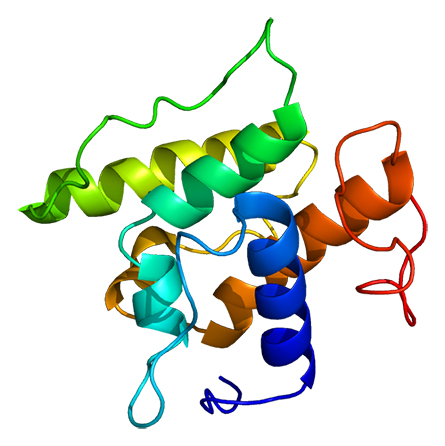From the journals: JLR
How our bodies adapt to nutrient starvation in cancer. How mimetic peptide treats systemic inflammation. Read about studies on these topics recently published in the Journal of Lipid Research.
Adapting to nutrient starvation in cancer

Cancer cells feed on amino acids, and the amino acid serine is needed for sphingolipid synthesis, a major process in cell survival, as well as apoptosis and inflammation. The enzyme serine palmitoyltransferase mediates sphingolipid synthesis and also can use the amino acids alanine and glycine to form deoxysphinganine, or dSA, in the absence of serine.
Work by Jean-Philip Truman of the State University of New York at Stony Brook and a team from institutions around the U.S., recently published in the Journal of Lipid Research, focused on the molecular mechanism of dSA in cell responses. The researchers first determined that serine starvation increased dSA levels in three cancer cell lines. Next, they showed that dSA interacts with sphingosine kinase 1, or SK1, causing SK1 proteolysis and increasing the levels of SK1 substrate, sphingosine, in cancer cells. The researchers further determined that increased sphingosine, or Sph, modifies the serine synthesis pathway by elevating reactive oxygen species. Finally, they showed that dietary restriction of both serine and glycine induced SK1 loss and increases in dSA and Sph levels in tumor xenografts in immunocompromised mice.
The research team concluded this study by postulating that in response to serine starvation, dSA directly acts on SK1, which signals Sph to modulate downstream cellular processes and ultimately stimulates cancer cell growth. All this new information can be applied to understanding the role of dSA in cancer cell metabolism.
Mimetic peptide treats systemic inflammation
Elevated levels of low-density lipoprotein, or LDL, have been associated with the development of atherosclerosis. Studies have determined that an exogenous peptide known as apolipoprotein A-I mimetic peptide 6F Tg6F binds to oxidized lipids with high affinity. Researchers have hypothesized that Tg6F targets the intestine to reduce systemic inflammation; however, they still do not know the exact mechanism of this action. Work in the Journal of Lipid Research by Pallavi Mukherjee of UCLA and a team of researchers based in California focused on learning more about that mechanism of Tg6F.
First, the researchers determined that a Western diet altered the intestinal microbiome and altered the expression of genes involved in regulating the interactions between bacteria and intestinal cells in mice that had been genetically altered to remove LDL receptors. The team then did experiments to determine increased gut permeability, increased presence of reactive oxygen species and increased oxidized phospholipids in the small intestine of mice fed a Western, or high-fat, diet.
The study showed that a Western diet decreased the gene expression of three cytokines responsible for antimicrobial activity and decreased the expression of two genes responsible for forming intestinal cells that secrete antimicrobial peptides. The researchers determined that a diet that contained Tg6F reduces intestinal dysbiosis and proposed a model wherein Tg6F protects against the increase in reactive oxygen species and oxidized phospholipids that are hallmarks of systemic inflammation associated with a Western diet.
Enjoy reading ASBMB Today?
Become a member to receive the print edition four times a year and the digital edition monthly.
Learn moreGet the latest from ASBMB Today
Enter your email address, and we’ll send you a weekly email with recent articles, interviews and more.
Latest in Science
Science highlights or most popular articles

Decoding how bacteria flip host’s molecular switches
Kim Orth will receive the Earl and Thressa Stadtman Distinguished Scientists Award at the ASBMB Annual Meeting, March 7–10, just outside of Washington, D.C.

Defining JNKs: Targets for drug discovery
Roger Davis will receive the Bert and Natalie Vallee Award in Biomedical Science at the ASBMB Annual Meeting, March 7–10, just outside of Washington, D.C.

Building better tools to decipher the lipidome
Chemical engineer–turned–biophysicist Matthew Mitsche uses curiosity, coding and creativity to tackle lipid biology, uncovering PNPLA3’s role in fatty liver disease and advancing mass spectrometry tools for studying complex lipid systems.

Redefining lipid biology from droplets to ferroptosis
James Olzmann will receive the ASBMB Avanti Award in Lipids at the ASBMB Annual Meeting, March 7–10, just outside of Washington, D.C.

Women’s health cannot leave rare diseases behind
A physician living with lymphangioleiomyomatosis and a basic scientist explain why patient-driven, trial-ready research is essential to turning momentum into meaningful progress.

Life in four dimensions: When biology outpaces the brain
Nobel laureate Eric Betzig will discuss his research on information transfer in biology from proteins to organisms at the 2026 ASBMB Annual Meeting.

